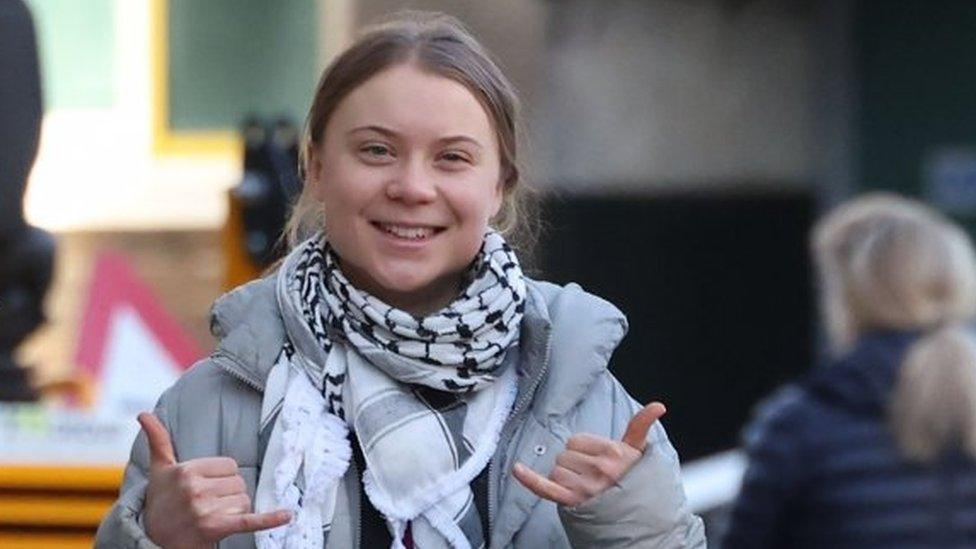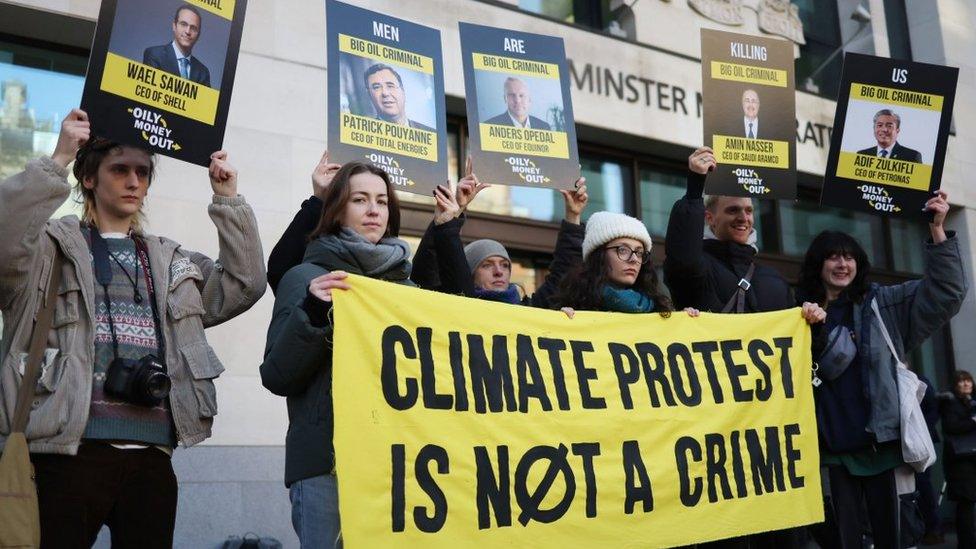Greta Thunberg outside court: We must remember who real enemy is
- Published

Greta Thunberg arrived at court on Thursday smiling as she made her way past photographers
Climate campaigner Greta Thunberg has defended climate activists facing prosecution in court, saying "we must remember who the real enemy is".
The 21-year-old was arrested during a demonstration near the InterContinental Hotel in Mayfair on 17 October.
Oil executives had been meeting inside for the Energy Intelligence Forum.
Ms Thunberg appeared at Westminster Magistrates' Court after previously denying breaching the Public Order Act 1986.
She is accused of breaching section 14 of the act by blocking the entrance to the hotel.
Ms Thunberg appeared at court along with two Fossil Free London protesters and two Greenpeace activists, who also pleaded not guilty to the same offence.
'Who real enemy is'
Outside court, Thunberg made a statement alongside some of her co-defendants in which she said: "Even though we are the ones standing here, climate, environmental and human rights activists all over the world are being prosecuted, sometimes convicted, and given... penalties for acting in line with science.
"We must remember who the real enemy is, what are we defending, who our laws are meant to protect."
She added: "History's judgement against those who deliberately destroy and sacrifice... resources at the expense of humanity, at the expense of all those who are suffering the consequences of the environmental and climate crisis... and at the expense of future generations, your own children and grandchildren will not be gentle."
Earlier, the court had heard that Greta Thunberg was given a "final warning" by police before she was arrested.
The court was told by Supt Andrew Cox, the most senior Metropolitan Police officer on the ground that day, that the protesters had refused to move despite repeated requests by police.

Protesters stood outside Westminster Magistrates' Court with placards in solidarity with Greta and other defendants
Demonstrators started to gather near the hotel at about 07:30 BST and police engaged with them about improving access for members of the public, which had been made "impossible", magistrates were told.
The court heard that as the protest continued the "majority" of people inside the hotel could not leave and people could not get inside.
Supt Cox told the court he had no choice but to impose a section 14 condition at about 12:30 BST, which directed that the protest could continue on the pavement to the south of the hotel.
Officers engaged with individual protesters and informed them of the section 14 condition, magistrates were told, including Ms Thunberg, who was standing outside the hotel entrance.
'She said she was staying'
Prosecutor Luke Staton said she was warned by one officer that her failure to comply would result in her arrest and, while that officer was engaged elsewhere, another officer spoke with Ms Thunberg and "gave her a final warning".
"She said that she was staying where she was, and so she was arrested," Mr Staton said.
The Swede continually made notes in a small notebook as proceedings went on.
Arriving at court earlier Ms Thunberg, the founder of the school strike for climate movement, walked past environmental protesters who were demonstrating "in solidarity" with the defendants.
They held up large yellow banners that read, "climate protest is not a crime" and cardboard signs saying, "who are the real criminals?", as well as placards.
Amnesty International UK's chief executive, Sacha Deshmukh, said Thunberg should be "applauded for her peaceful climate protests."
"The charges against Thunberg and all the activists highlight everything that's wrong with the policing of protests in the UK today," he said.
"Police are increasingly using their expanded powers to silence legitimate protests."

Listen to the best of BBC Radio London on Sounds and follow BBC London on Facebook, external, X, external and Instagram, external. Send your story ideas to hello.bbclondon@bbc.co.uk